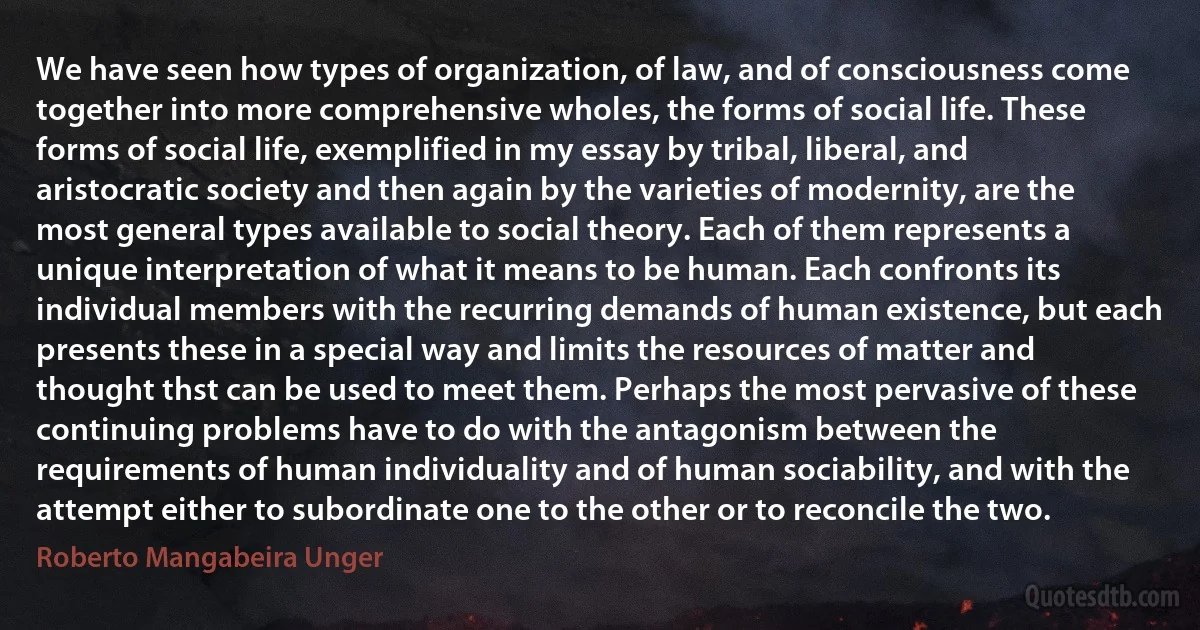
We have seen how types of organization, of law, and of consciousness come together into more comprehensive wholes, the forms of social life. These forms of social life, exemplified in my essay by tribal, liberal, and aristocratic society and then again by the varieties of modernity, are the most general types available to social theory. Each of them represents a unique interpretation of what it means to be human. Each confronts its individual members with the recurring demands of human existence, but each presents these in a special way and limits the resources of matter and thought thst can be used to meet them. Perhaps the most pervasive of these continuing problems have to do with the antagonism between the requirements of human individuality and of human sociability, and with the attempt either to subordinate one to the other or to reconcile the two.
Roberto Mangabeira UngerRelated topics
attempt comprehensive essay general human interpretation law life matter meet modernity organization perhaps recurring seen sociability subordinate thought tribal unique way means presentsRelated quotes
The universe is of the nature of a thought or sensation in a universal Mind... To put the conclusion crudely - the stuff of the world is mind-stuff. As is often the way with crude statements, I shall have to explain that by "mind" I do not exactly mean mind and by "stuff" I do not at all mean stuff. Still that is about as near as we can get to the idea in a simple phrase. The mind-stuff of the world is something more general than our individual conscious minds; but we may think of its nature as not altogether foreign to feelings in our consciousness... Having granted this, the mental activity of the part of world constituting ourselves occasions no great surprise; it is known to us by direct self-knowledge, and we do not explain it away as something other than we know it to be - or rather, it knows itself to be.

Arthur Eddington
Just as economic pressure from the base ... is able to modify the production of surplus value, so pressure grounded in spatial practice is alone capable of modifying the apportionment of that surplus value - i. e. the distribution of the portion of social surplus production allotted to society's collective 'interests', to so-called social services. Such grass-roots pressure, if it is to be effective in this regard, cannot be confined to attacking the state qua guardian of the 'general interest'. For this state, born of the hegemony of a class, has as one of its functions - and a more and more significant function - the organization of space, the regularization of its flows, the control of its networks. It devotes to these purposes a considerable part of global surplus value, of the surplus production assigned to the running of society.

Henri Lefebvre
... a rather different class of applications of the idea of best allocation of scarce resources... usually referred to as the theory of optimal economic growth. In most studies of this kind made in the countries with market economies there is not an identifiable client to whom the findings are submitted as policy recommendations. Nor is there an obvious choice of objective function, such as cost minimization or profit maximization in the studies addressed to individual enterprises. The field has more of a speculative character. The models studied usually contain only a few highly aggregated variables. One considers alternative objective functions that incorporate or emphasize various strands of ethical, political, or social thought. These objectives are then tried out to see what future paths of the economy they imply under equally simplified assumptions of technology or resource availability.

Tjalling Koopmans
The term "cult" is always one of individual judgment. It has been variously applied to groups involved in beliefs and practices just off the beat of traditional religions; to groups making exploratory excursions into non-Western philosophical practices; and to groups involving intense relationships between followers and a powerful idea or leader. The people I have studied, however, come from groups in the last, narrow band of the spectrum: groups such as the Children of God, the Unification Church of the Reverend Sun Myung Moon, the Krishna Consciousness movement, the Divine Light Mission, and the Church of Scientology. I have not had occasion to meet with members of the People's Temple founded by the late Reverend Jim Jones, who practiced what he preached about being prepared to commit murder and suicide, if necessary, in defense of the faith.

Margaret Singer
Comets are flying around the solar system. As they near the sun, they develop a tail as material is blown off by the solar wind. Most astronomers agree that comets cannot be more than 10,000 years old. They would have completely disappeared by now. Some scientists have recognized this as a serious problem for the theory that the earth is billions of years old, so they have proposed a new theory that new comets are constantly being introduced into the solar system to replace the old ones that burn out. They say they are coming from the "Oort Cloud.” No one has ever seen this Oort cloud, Oort never saw the Oort cloud! There is NO scientific evidence for its existence, but in their mind, this answers the serious problem the short lives of comets creates. There is a simpler answer, of course: the universe is NOT billions of years old!

Kent Hovind
